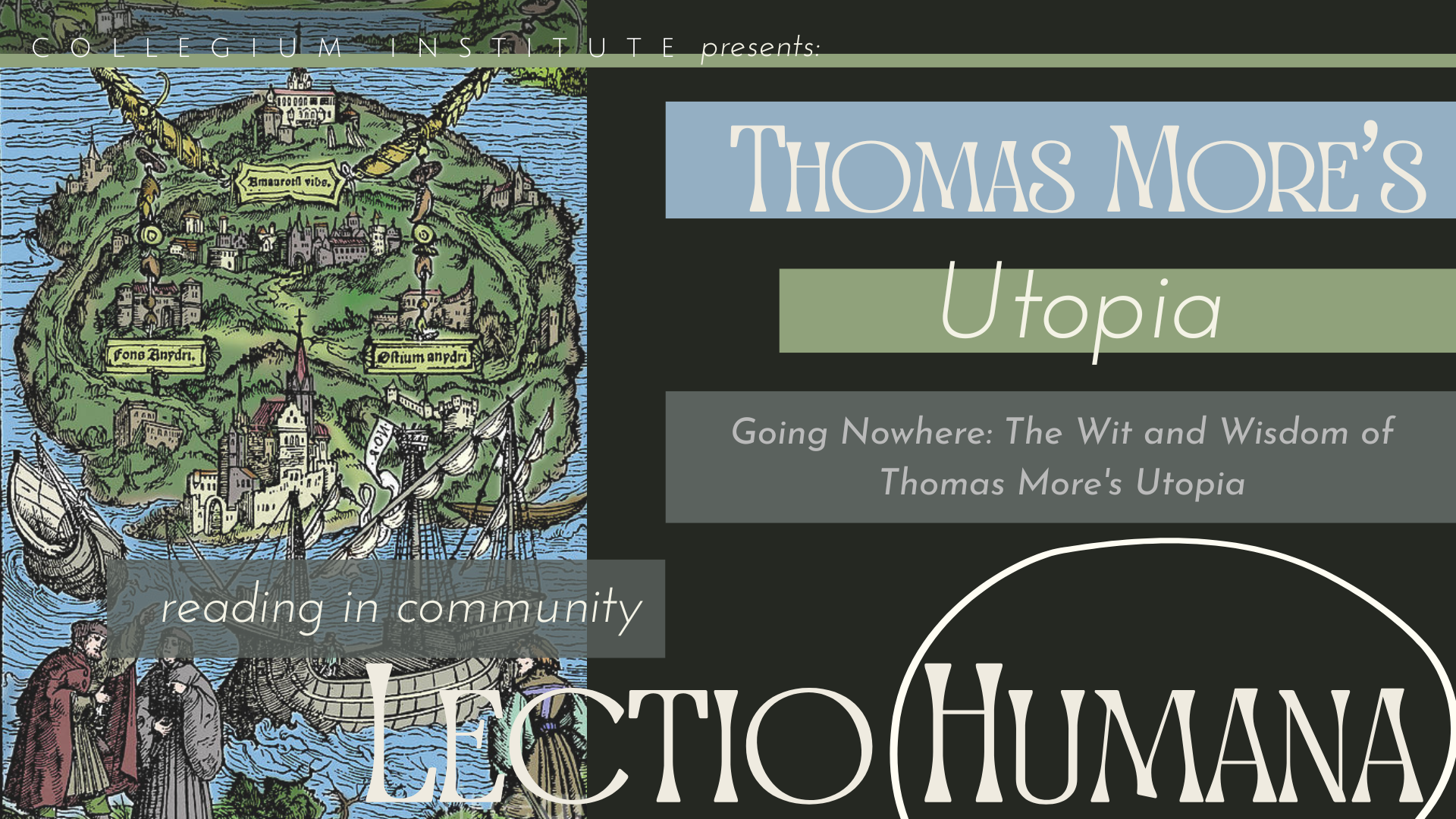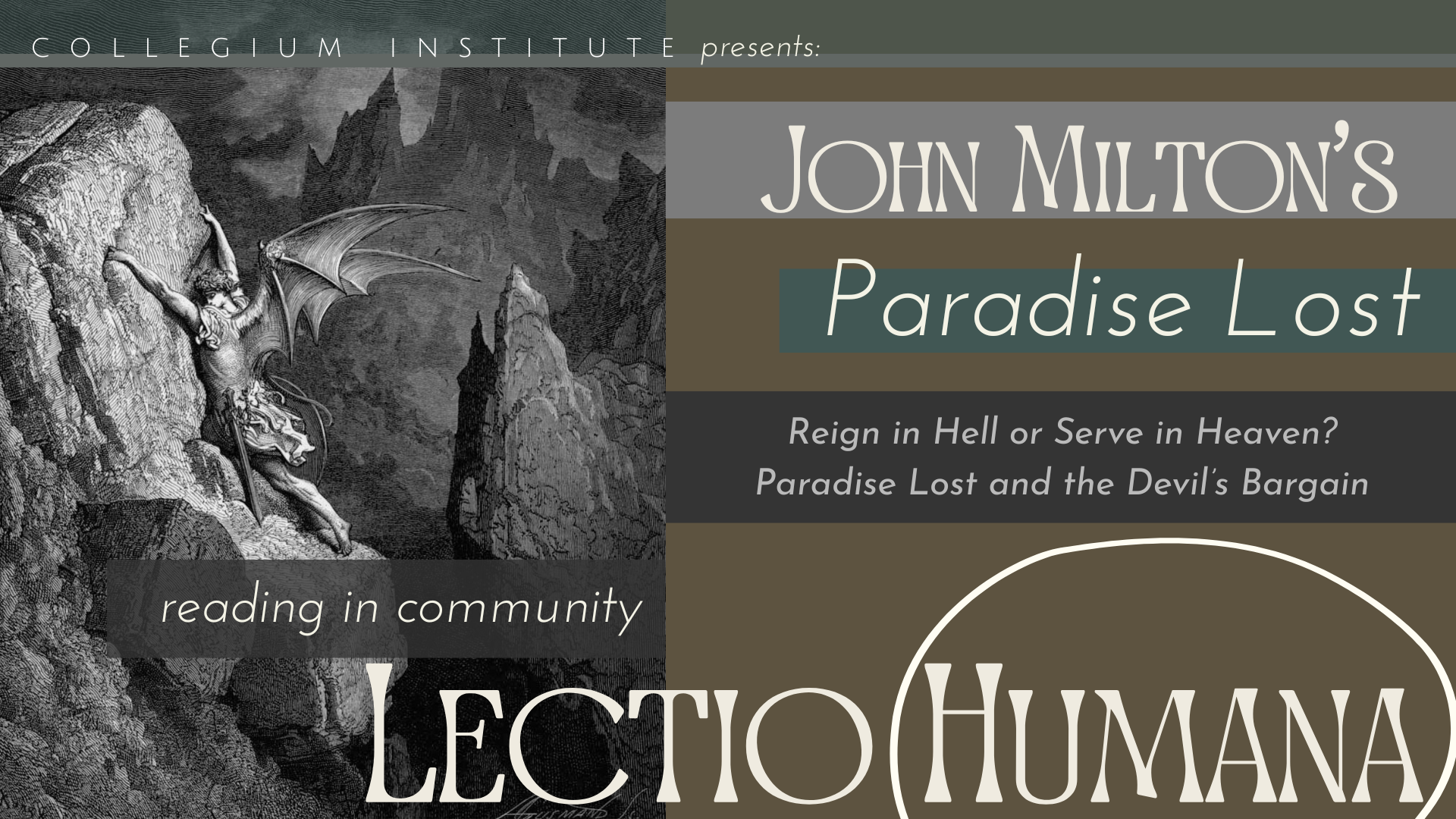
Lectio Humana
Lectio Humana engages students in reading discussions on major works and authors that are cultural touchstones. Works explored include Plato’s Symposium, Augustine’s Confessions, Boethius’ Consolation of Philosophy, Dante’s Divine Comedy, and Shakespeare’s dramas.
There is no Frigate like a Book
To take us Lands away,
Nor any Coursers like a Page
Of prancing Poetry –
This Traverse may the poorest take
Without oppress of Toll –
How frugal is the Chariot
That bears a Human soul.
-Emily Dickinson
Sign Up Now for the Spring 2026 Reading Group!
In this semester's Lectio Humana, Going Nowhere: The Wit and Wisdom of Thomas More's Utopia, we will undertake a thorough examination of More's Utopia together with some of More's other writings on trials and tribulation, love and friendship as well as some scenes from Shakespeare who was thoroughly influenced by Thomas More, from his first great tragedy Richard III based on More's history of Richard III to his last great play The Tempest set on a fictional island in the brave new world.
We'll raise several crucial questions during our journey to Utopia: what is the ideal political regime? Can an ideal political regime exist in practice? What does it mean to be a good citizen? Does education benefit the state or is the ivory tower too theoretical to have practical impact? Is private property the basis of the state or the source of all our woe? Is Utopia the stuff of nightmares or such stuff as dreams are made on? And perhaps most fundamentally, what does it mean to be human and what practical, political consequences follow from that question?
Previous Seminars
Mark Twain once wryly remarked of John Milton’s Paradise Lost that it was “a classic—something that everybody wants to have read and nobody wants to read.” Voltaire once dismissed Milton as a “barbarian who writes a tedious commentary in ten books of rumbling verse, on the first chapter of Genesis.” So why read Paradise Lost?
Well, Paradise Lost is by unanimous consent the greatest epic poem written in the English language, an epic rivaled in Western literature only by Homer’s Iliad and Odyssey, Virgil’s Aeneid, and Dante’s Divine Comedy. Milton’s audacious epic, dictated to his daughters in his blind old age, shines a celestial light upon humanity’s deepest questions: why is there evil in a world created by God? Where do human beings come from, and for what purpose do we exist? Is it better to reign in Hell or to serve in Heaven? How ought we respond to evil in the world and in our own hearts?
It is the aim of this semester’s Lectio Humana Reign in Hell or Serve in Heaven? Paradise Lost and the Devil’s Bargain to read and reflect on Milton’s masterpiece, wrestle with his powerful questions, and feel the force of Wordsworth’s magnificent praise—“Milton! thou shouldst be living at this hour: / England hath need of thee… / Oh! raise us up, return to us again; / And give us manners, virtue, freedom, power.”
2024-25
So great is Shakespeare’s capacity to capture universal human experiences in language that Harold Bloom, the greatest literary critic of the last half century, advanced the claim that Shakespeare invented the human. Following Shakespeare, we asked what a piece of work is man: a giddy thing or a quintessence of dust? We examined Shakespeare’s thoughts on love, religion, politics, friendship, ambition, work, and leisure. And yes, we will pose the famous question—to be or not to be? We examined four of Shakespeare's masterpieces of history, tragedy, comedy, and romance: Julius Caesar, Hamlet, Much Ado About Nothing, and The Tempest. Not only will we study Shakespeare on the page, we also experienced Shakespeare on the stage through a live showing of Much Ado About Nothing at the Lantern Theater Company in Philadelphia.
2023-24
Can you be happy amidst misery? If your possessions, your pleasures, your reputation, your friends, and your family all fail you, if they are all taken from you, what do you have left? For Boethius, these questions were not merely theoretical, but a dreadful reality. Stripped of power, pleasure, fame, riches, friends, and family, with a death sentence hanging over his head, Boethius sought refuge in the embrace of Lady Philosophy as recounted in a dazzling work of poetry and prose called the Consolation of Philosophy. But why seek consolation for concrete woes in the airy abstractions of philosophy? Boethius' answers to this pressing question deeply influenced the likes of Alfred the Great, Chaucer, Elizabeth I, St. Thomas Aquinas, and Dante. This semester we read through arguably the single most important work of philosophy from the Fall of Rome to the rise of Scholasticism, and we confronted the classic question of philosophy's purpose in our lives.



